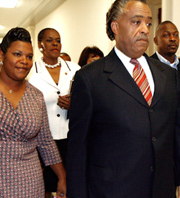The Truth About Jena
John Moe
Michael May
JANUARY 19, 2008
- Mychal Bell's Parents & Co. on Capitol Hill
- (Chip Somodevilla/Getty Images)
- Enlarge This Image
Web Resources
More From John Moe
- Now you can draw state redistricting maps too
- The coming conundrum of home DNA testing
- What mattered this year in technology
More From Michael May
John Moe: Is there a racial divide in Jena?
Amy Waldman: There is a racial divide in Jena, and mostly it takes geographic form. The actual town of Jena has never incorporated the black areas around it. Even the Jena Six technically don't live in Jena, they live right outside it. And that means that those living outside the town lines, they can't vote for mayor, they can't vote for police chief, they don't get their garbage collected, things like that. That said, relations are largely cordial. At the high school, I think in general, the different races get along. I think that's one place where you actually see more integration than other places.
There emerged two characters in your story, and really in the reporting of the story. There was Mychal Bell, the black student who participated in the fight, and there was the white prosecutor. How were they, in your understanding of these people, and how cut-and- dried were their roles in these incidents?
Reed Walters [the prosecutor] grew up in a town near Jena, went to law school in Louisiana, and came back and settled in Jena and has never left. And he said to me, "I feel as a prosecutor, I'm representing the values of my community." I think he felt he was doing the right thing. He was quite certain and insistent he was doing the right thing, and yet wore blinders to how narrowly the nature of "his community" was defined. Mychal Bell and the Jena Six became a group of icons for people to rally around.
When you compare this to the Civil Rights movement of the 1960s, do we lack the right symbols, the right characters, the right stark imagery to effect positive social change, or are the issues so murky that we can't have that simplicity this time around?
I think it's almost a misreading of the 60s. Then, individuals were used in service of the larger issue. With Rosa Parks, the issue was where could you sit on the bus; it wasn't about Rosa Parks herself. I think she was aware of that, and [so was] everyone else at the time. It was about characters or symbols, it was about laws and enforcement of laws. And now when we make it about symbols and laws we're missing the point. Mychal Bell is a 16-year-old kid who punched another kid, and because of the way he was charged, became a hero for it.
I'm not sure if that's the civil rights movement we want today. Rosa Parks, when she acted, she wasn't just acting for herself, she was acting for all blacks at that time who couldn't sit where they wanted to sit, and couldn't vote and so on. With the Jena Six, I didn't see where it was about more than just the Jena Six.
In Jena, I felt like there are specific issues that do need to be addressed when it comes to race. The quality of indigent defense, which affects blacks and whites, but I would argue disproportionately affects blacks. The fact that there are still some schools that in fact have never actually desegregated. So you have parents who are sending their children outside of town to public, all-white schools so they can avoid integration. The town lines, so the black areas are mostly excluded from the town. These are difficult issues that take time to resolve, that will take tenacious, dogged, not-very-exciting work, often bureaucratic work. I think it's easier to go for the character-driven story, rather than taking on these drier issues.
Amy Waldman, thanks for joining us.
Thanks for having me.
-
- Music Bridge:
- To Dance With the White Dog
- Artist: Takashi Wada
- CD: Araki (Onitor)







Comments
Comment | Refresh
Post a Comment: Please be civil, brief and relevant.
Email addresses are never displayed, but they are required to confirm your comments. All comments are moderated. Weekend America reserves the right to edit any comments on this site and to read them on the air if they are extra-interesting. Please read the Comment Guidelines before posting.
You must be 13 or over to submit information to American Public Media. The information entered into this form will not be used to send unsolicited email and will not be sold to a third party. For more information see Terms and Conditions and Privacy Policy.